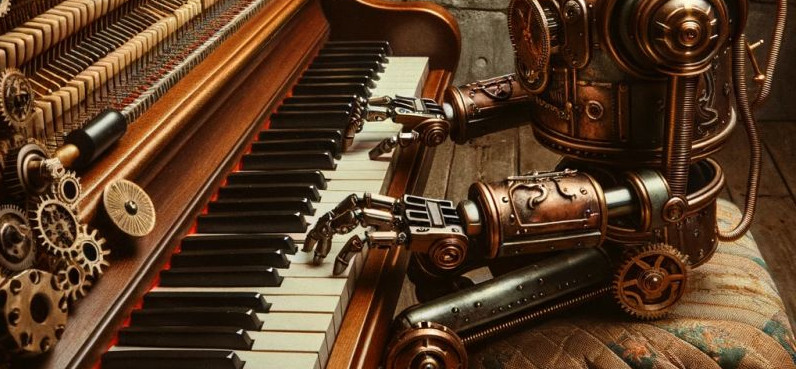Generative Music AI Workshop
![]()
Next workshop dates
June 17-21 2024
![]()
Location
Sala Nau, Campus Poblenou
Universitat Pompeu Fabra
Roc Boronat 138, Barcelona
![]()
Closed
Registration contact
[email protected]
About the Workshop
The workshop is designed as a collaborative space for music technologists and musicians. The goals of the workshop are to:
- explore software tools of relevance for music AI;
- create AI-driven musical compositions;
- bridge technology and creative music practice.
This is a hands-on event, focused on practical experience with a sprinkling of discussions on AI in music. Participants self-organize into teams, each integrating music tech specialists and musicians.
The workshop builds on top of the online Generative Music AI Course available for free on The Sound of AI YouTube channel. This online course offers the essential theoretical and practical knowledge required for the workshop.
Who Can Attend?
We welcome 30 participants: 20 from the tech side (like AI music engineers and MIR researchers, music tech hackers) and 10 musicians.
Participants are expected to have followed the complimentary lectures from the Generative Music AI Course on The Sound of AI YouTube channel.
For technologists, it's expected that they:
- Have strong coding skills, ideally in Python
- Can work with music data like waveforms and MIDI
- Are capable of developing symbolic-based generative music systems, such as markov chains, transformers, and generative grammars
- Grasp the applications of generative music
Musicians should:
- Be familiar with prevalent music AI tools available, like Magenta
- Have hands-on experience with Digital Audio Workstations (DAWs)
- Ideally, possess some knowledge in using AI for music production
- Understand the use cases of generative music.
Location
The workshop takes place at Universitat Pompeu Fabra in Barcelona.
Draft Agenda
Day 1
- 10h. Workshop intro
- 10:30h. One to all presentations + Informal Networking + Speed dating + One to all presentations
- 13h. Team formation (each team has 2 technologists + 1 musician)
- 13:30h. Lunch break
- 14:30h. Brainstorming + project ideation
- 17:30h. Wrap up
- 18h. End of the day
Day 2
- 10h. Presentation of MTG tools of relevance to generative music AI
- 11h. Project time
- 13h. Lunch break
- 14h. Project time + Mentorships (from 15h to 17h)
- 17:30h. Presentation of project ideas
- 18h. End of the day
Day 3
- 10h. Open discussion: The ethics of music AI
- 11h. Project time
- 13h. Lunch break
- 14h. Project time + Mentorships (from 15h to 17h)
- 17:30h. Wrap up
- 18h. End of the day
- 20h. Concert with works by the participants (in collaboration with Phonos)
Day 4
- 10h. Open discussion: how’s AI impacting the music industry?
- 11h. Project time
- 13h. Lunch break
- 14h. Project time + Mentorships (from 15h to 17h)
- 17:30h. Wrap up
- 18h. End of the day
Day 5
- 10h. Open discussion: what are the challenges and expectations in generative music systems?
- 11h. Project time
- 13h. Lunch break
- 14h. Project time + Mentorships (from 15h to 17h)
- 16h. Project presentations
- 18h. End of workshop + beers
Registration
Interested people should make a pre-registration and depending on the number of candidates a selection will be done before the final registration and payment is done.
One-time fee: €150
Organizers
The Sound of AI, in partnership with the Music Technology Group at Universitat Pompeu Fabra organize the Generative Music AI Course and its associated workshop.
Instructors
- Dr. Valerio Velardo, director of The Sound of AI - a leading ecosystem for music AI.
- Dr. Iran Roman, researcher at Music and Audio Research Laboratory at New York University.
- Prof. Xavier Serra, director of the Music Technology Group at Universitat Pompeu Fabra.
- Researchers of the Music Technology Group participate as Teaching Assistants.
Mentorships
Throughout the workshop, teams can book mentorship sessions with Valerio Velardo, Iran Roman, and researchers of the Music Technology Group.
Materials and references
Slides and code for the course: https://github.com/musikalkemist/generativemusicaicourse
Course preparatory videos: https://www.youtube.com/playlist?list=PL-wATfeyAMNqAPjwGT3ikEz3gMo23pl-D

